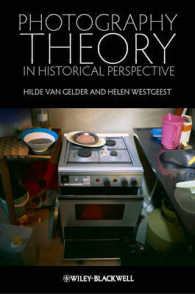- ホーム
- > 洋書
- > 英文書
- > History / World
Full Description
Power struggles between debtors and creditors about unpaid debts have animated the history of economic transformation from the emergence of capitalist relations to the recent global financial crashes. Illuminating how ordinary people fought for economic justice in Mexico from the eve of independence to the early 2000s, this study argues that conflicts over small-scale debts were a stress test for an emerging economic order that took shape against a backdrop of enormous political and social change. Drawing on nearly 1,500 debt conflicts unearthed from Mexican archives, Louise E. Walker explores rapidly changing ideas and practices about property rights, contract law, and economic information. This combination of richly detailed archival research, with big historical and theoretical interpretations, raises provocative new questions about the moral economy of the credit relationship and the shifting line between exploitation and opportunity in the world of everyday exchange.
Contents
Introduction; 1. Little debts: Justice and citizenship in small claims, 1810s-1860s; 1.1 A contractual society; 1.2 The judicial city; 1.3 Mediating debt disputes in the juicios verbales; 1.4 The parameters of economic justice; 1.5 Continuity and change after 1812; 1.6 The humdrum as historic; 2. Broken contracts: Precaution and risk in litigation and law, 1860s-1870s; 2.1 Debt litigation on the rise; 2.2 Trading information with friends and strangers; 2.3 Risk, uncertainty, and the providencias precautorias; 2.4 Property seizure and the politics of property rights; 2.5 Avoiding obligations and litigating trust; 2.6 Law and economy: Making rules for unpaid debts; 2.7 Between two worlds; 3. Unworthy: Economic information in credit reports, 1880s-1920s; 3.1 Credit reports and the new horizon of bureaucratic trust; 3.2 Banamex and financial exclusion; 3.3 Evaluating creditworthiness; 3.4 Institutional lending in a time of revolution; 3.5 Defining the boundaries of economic honour; 3.6 Economic information from gossip to bureaucracy; 4. Bad cheques: Property crime and the moral economy of financialisation, 1930s-1980s; 4.1 The criminalisation of uncovered cheques; 4.2 Economic citizenship and financial inclusion; 4.3 Misuse, malfeasance, and the growing pains of financial modernity; 4.4 Social inertia, friction, and the latent coercion of financialisation; 4.5 From delinquency to vulnerability; 5. Asking for help: Letters about fairness and dispossession, 1990s-2000s; 5.1 From citizens to financial service users; 5.2 Institutional borrowing in an era of crisis; 5.3 Indebtedness and dehumanisation; 5.4 Economic storytelling and the power of the president; 5.5 Usury and the new purgatory; 5.6 The Credit Bureau and the Black List; 5.7 Villains and victims; Conclusion; Notes; References; Index.
-

- 電子書籍
- 午後5時のメイド【タテヨミ】第27話 …
-

- 電子書籍
- 幻魔大戦deep5






